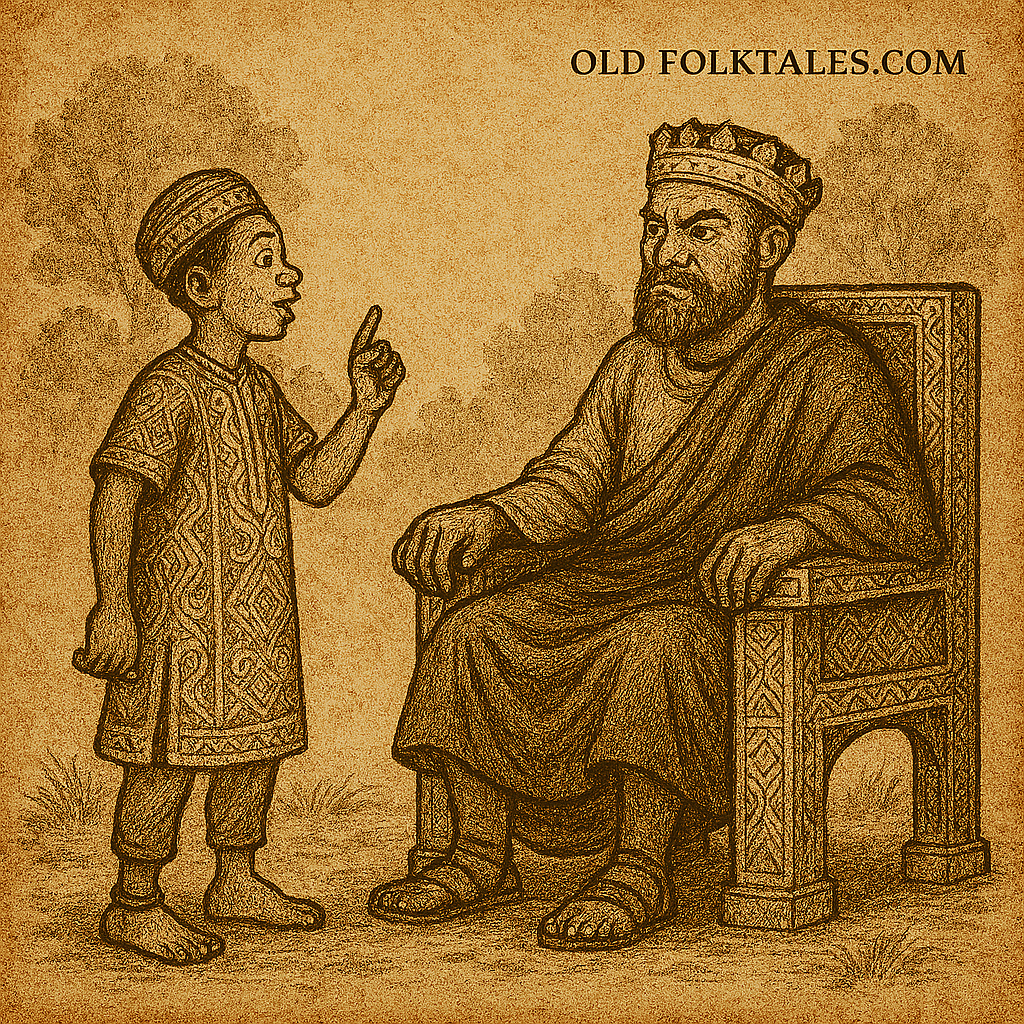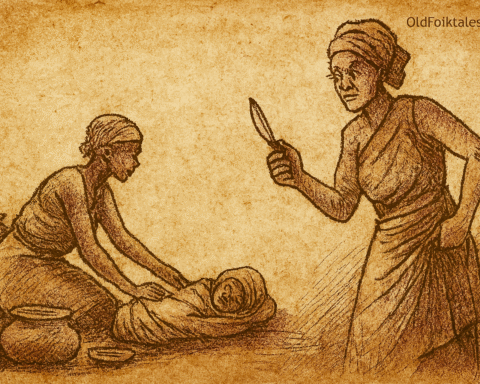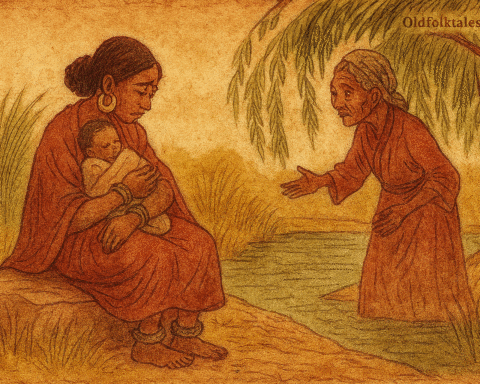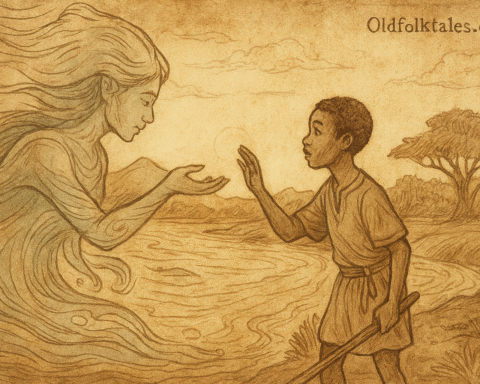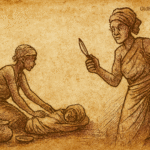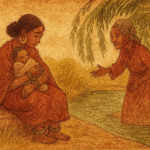In the ancient days when the morning mist still held secrets and wisdom flowed through the hills like sacred rivers, there lived a king whose arrogance knew no bounds. Nfo Atabe ruled over a vast kingdom with an iron fist and a heart swollen with pride. This was a man who demanded that every festival, every monument, every funeral, every marriage celebration, indeed, every ceremonial activity in his realm, bear his name or the mark of his absolute authority.
The Sacred Right Stolen
But Nfo Atabe’s greatest transgression came when he committed an unthinkable act: he stripped families of their most sacred duty, the naming of their children. “Tegheh kwu!” the people exclaimed in horror. The king decreed that he alone would name all children born under his reign, stealing from fathers and grandfathers the ancient tradition that connected generations through carefully chosen family names.
Men gathered in shadowed corners, gnashing their teeth and cursing the king between bitter gulps of palm wine. Like wounded dogs, they tucked their tails between their legs, holding their heads in shame as their ancestral rights crumbled before the king’s overwhelming pride.
The Miraculous Birth
During this dark time, a woman gave birth to a son. Following the king’s edict with a heavy heart, she strapped her precious child to her back and began the journey to the palace. But before she had descended two hills and crossed two streams, something extraordinary happened, her infant son spoke with the clarity of a wise elder.
“Mother, let’s go home,” the baby declared, his voice carrying ancient wisdom. “Why should the fon name me? Don’t I have fathers, mothers, uncles, grandparents? Tegheh kwu! Dead-Father-of-Mine! The fon will not name me. My name is Metse-Tsate-Nfo.”
The woman stood frozen in astonishment, her mind reeling. “How is this possible?” she whispered to herself, gathering her anxiety in her palms as the Beba say. Her son merely a baby claimed his name meant “Intelligence-Greater-Than-the-King’s,” or as he would become known in Pidgin English, “Sense-Pass-King.”
Fearing the king’s terrible wrath, for “the prince who is always looking at the throne is the first to be banished from the palace,” she turned around and walked home, keeping her son’s miraculous gift secret from the royal court.
The King’s Fury
Years passed like seasons through the forest before word finally reached Nfo Atabe’s ears. A woman named Manele had indeed borne a son, a child who had dared to name himself, choosing the audacious title Metse-Tsate-Nfo. How brazen! How fearless! How utterly impertinent! The king’s rage burned like wildfire through dry grass. This pretentious sapling would learn that no one stood above the law of the land his law. Death, he declared, would be the punishment for such insolence.
The Haircut Trap
One morning, the royal ntsendia (messenger) appeared at Metse-Tsate-Nfo’s home with a curious summons. “The fon requests that you give him a haircut,” the messenger announced solemnly.
The boy raised his eyebrows in surprise. The king had special barbers, why would he summon a mere commoner, a child no less, for such an honor? But Metse-Tsate-Nfo, wise beyond his years, simply boiled fresh corn, placed several warm ears in his bag, and followed the ntsendia to the palace.
In the royal chambers, King Atabe laid out an impressive array of gleaming razors. The boy took his position beside the throne, but before beginning, he coughed into cupped hands and stepped forward, offering the king the warm maize cobs from his bag. The sweet aroma like baby-palm wine favored by young women filled the ornate room.
Nfo Atabe accepted the gift and, unusually, didn’t call for his tasters before sinking his teeth into the succulent corn. He savored each kernel while Metse-Tsate-Nfo skillfully cut his hair, the royal locks falling like autumn leaves to the marble floor.
When the haircut was complete, King Atabe smiled with the satisfaction of a weary hunter who finds a helpless deer in his final trap.
“My son, have you finished?” he asked with deceptive gentleness.
“Yes, Mbeh,” the boy replied respectfully.
“Is it well done?”
“I think Your Majesty will be pleased.”
Atabe released that throaty patrician laugh of a demigod before springing his trap. “Now, my son, I want you to put all my hair back on my head.”
The Clever Counter-Challenge
Metse-Tsate-Nfo stammered in apparent confusion. “Mbeh, did I hear you correctly?”
“I order you to restore my hair, or you die at sunset,” the king declared triumphantly. “You’ve committed an unpardonable offense cutting the king’s hair when you’re neither nkwob nor kingmaker.”
But Sense-Pass-King had anticipated this moment. With respectful composure, he replied, “Great King, if that is your wish, I will do it on one condition…”
“Speak!” Atabe commanded, amused by the boy’s audacity.
“I want you to put all the grains of corn you consumed while I shaved your hair back on the cob. Once that’s accomplished, your hair will be safely restored to your head.”
The ntsendia and bekwob (nobles) watching this drama unfold hid their faces in their palms and laughed heartily, while Atabe laughed even louder to maintain his dignity.
The Pig Challenge
Frustrated but not defeated, the king devised another test. He summoned five young piglets and distributed them among four young men and Metse-Tsate-Nfo, ordering each to raise their pig and bring him a fully-grown swine each year.
Years passed. The other young men dutifully delivered their pigs annually, but Sense-Pass-King never appeared. Finally, an enraged Atabe summoned him to court. As dusk approached and people prepared to leave, Metse-Tsate-Nfo came running into the courtyard, huffing and puffing.
“You have defied your king. The penalty is death,” Atabe declared.
“But my lord,” the boy gasped, “I was delayed assisting my father, who was having a baby.”
“Impossible! How can a man bear a child?”
“The same way, Mbeh, that the male pig you gave me can bear offspring.”
The crowd erupted in appreciation while an angry Nfo Atabe dismissed the assembly.
The Final Trap
Moons passed before a new rumor spread through the land. The king was constructing a grand stage before the palace, planning to crown Metse-Tsate-Nfo as the most intelligent person in the kingdom. Suspicious of this sudden honor, the clever boy secretly dug a tunnel from his house to the palace, discovering that the coronation chair would sit atop a concealed pit.
On the appointed day, Metse-Tsate-Nfo arrived wearing the finest embroidered tob the villagers had ever seen, black and red like a prince’s garment. The coronation chair was magnificently covered with expensive ndip, black cotton cloth reserved for special occasions.
After delivering a lengthy speech praising the boy’s intelligence and declaring him “the future of a great people” who would “join the ranks of the Unknowable,” King Atabe invited Metse-Tsate-Nfo to his throne.
The moment the boy’s body touched the ndip, the chair collapsed, sending him tumbling into the pit below. The king’s ntsendia leaped to their feet, ululating like women, hurling stones and spears into the hole. But Sense-Pass-King had vanished through his secret tunnel, running safely home.
The Triumphant Return
When dawn broke, Metse-Tsate-Nfo was seen sitting peacefully before his mother’s house, smoking his pipe contentedly. Upon hearing this news, it is said that Nfo Atabe fainted from shock. The tyrant king was forced to abdicate, and the clever child who had consistently outwitted him was crowned as the new ruler.
The Moral Lesson
This powerful Beba folktale teaches us that wisdom and intelligence can triumph over tyrannical power and arrogance. Metse-Tsate-Nfo’s victory demonstrates that true leadership comes not from authoritarian control, but from quick thinking, strategic planning, and the courage to stand up to injustice. The story reminds us that even the mightiest ruler can be brought low by their own pride, while those who use their intelligence ethically and cleverly can overcome seemingly impossible odds. It also celebrates the importance of preserving cultural traditions and resisting unjust authority.
Knowledge Check
Q1: What does the name “Metse-Tsate-Nfo” mean in this Beba folktale? A: “Metse-Tsate-Nfo” means “Intelligence-Greater-Than-the-King’s” or “Sense-Pass-King” in Pidgin English, representing the child’s superior wisdom compared to the tyrannical ruler.
Q2: What sacred tradition did King Nfo Atabe steal from families in this African folktale? A: King Atabe stole the sacred right of naming children from families, decreeing that only he could name all children born in his kingdom, which violated the ancient male tradition of bestowing family names to maintain lineage.
Q3: How did Metse-Tsate-Nfo escape the king’s haircut trap? A: He countered the king’s impossible demand to restore his cut hair by requesting that the king first put back all the grains of corn he had eaten, demonstrating that both requests were equally impossible.
Q4: What cultural elements from Cameroon appear in this Beba story? A: The story includes Beba cultural elements such as traditional clothing (tob), expensive black cotton cloth (ndip), royal titles (fon, nkwob, bekwob), messengers (ntsendia), and various proverbs reflecting Beba wisdom.
Q5: How did Sense-Pass-King survive the final assassination attempt? A: He anticipated the trap by secretly digging a tunnel from his house to the palace, discovering the pit beneath the coronation chair, which allowed him to escape through his underground passage when the chair collapsed.
Q6: What lesson does this Cameroon folktale teach about leadership and intelligence? A: The story teaches that true leadership requires wisdom and ethical behavior, not tyrannical control, and that intelligent planning and courage can overcome even the most powerful oppressors who abuse their authority.
Source: The sacred door and other stories: Cameroon folktales of the Beba (1st ed.). Ohio University Press.
